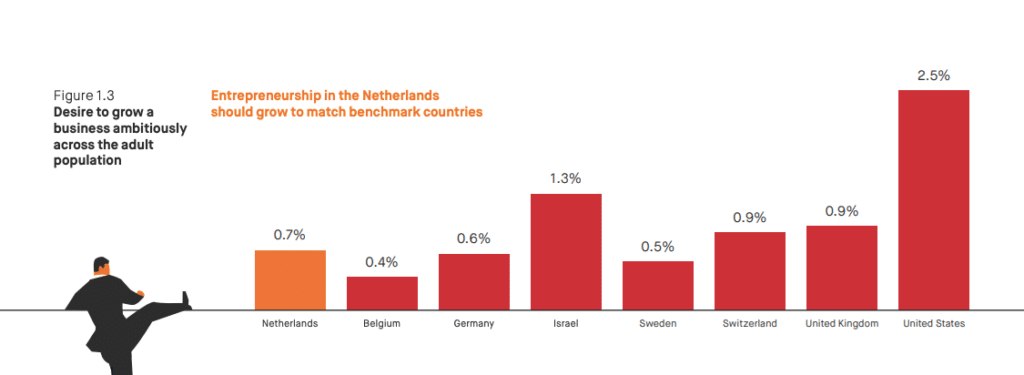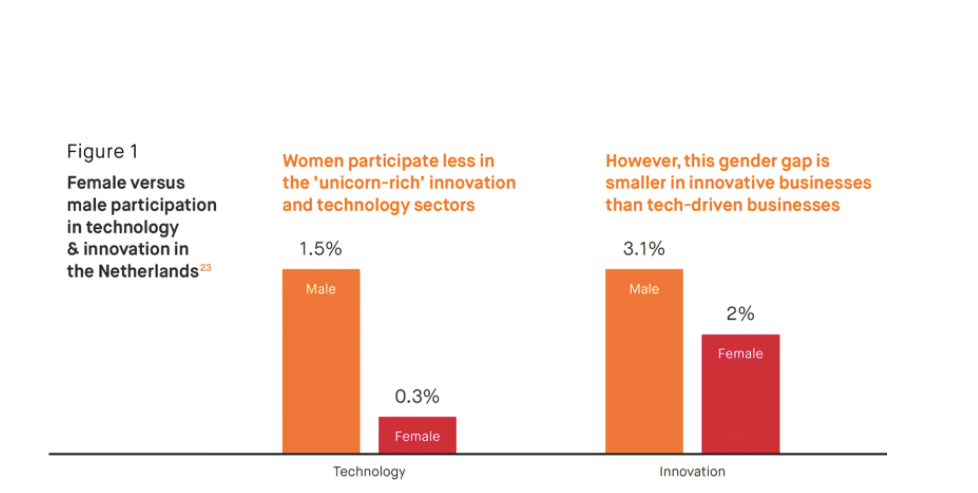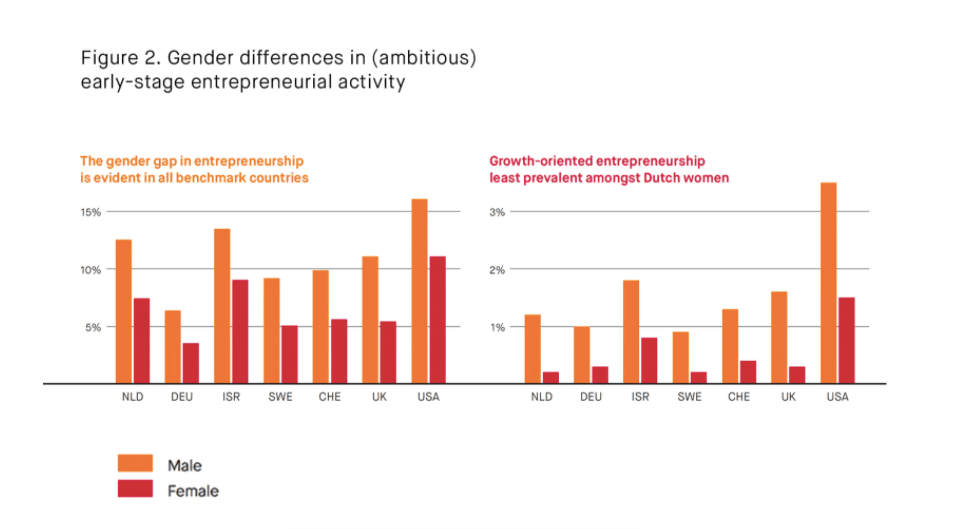The Netherlands is one of the best startup ecosystems in the world. However, relatively few startups transform into scale-ups and unicorns. A culture that enables the growth of startups seems to be missing. This is called the Dutch entrepreneurship paradox.
In the latest development, Techleap.nl, in partnership with Utrecht University School of Economics, published a report – Thinking Bigger: How ambitious is the Dutch entrepreneur?
The report explores the level of ambition of Dutch entrepreneurs and the phenomenon of the Dutch entrepreneurship paradox. Here are some of the key takeaways from the report.
Starting a business > growing it successfully

According to the findings, most entrepreneurs are not focused on scaling their business models, especially in the Netherlands.
Data from the Global Entrepreneurship Monitor (GEM) shows that compared internationally, the Dutch place higher value on self-employment and starting their own business than growing it successfully.
This is what the report calls the Dutch Entrepreneurship Paradox.
Female versus male participation in tech and innovation

Dutch female entrepreneurs are less frequently involved in technology or innovation-related activities than their male counterparts. However, this gender gap is smaller in innovative businesses than tech-driven businesses, shows the report.
The lack of women in tech and innovation is due to the low percentage of women in STEM education compared to peer countries, claims the report.
Women entrepreneurs are growing, but..!

The number of women entrepreneurs is growing, but those aiming for substantial growth are still rare. It is evident when comparing the growth-oriented entrepreneurship of Dutch women with Israeli or American women.
“Even though solving this issue is far from straightforward, ecosystem support should probably focus more on facilitating ambitious female entrepreneurship to enhance their ability to attract venture capital and grow large, valuable businesses,” says the report.
Fear of failure

Dutch women have a higher fear of failure than men and the differences are even higher for the perceived confidence to start and run a business. With a difference of more than 20 per cent, Dutch women are far less confident in startup skills than men.
Gender differences in early-stage entrepreneurial activity

The finding suggests that the gender gaps in overall early-stage entrepreneurship are smaller compared to gender gaps in ambitious, growth-oriented early-stage entrepreneurship.
13% of the Dutch male population (18-64 years old) are active in early-stage entrepreneurial activity versus 7 per cent of the women. For ambitious entrepreneurship, men show a 1.2 per cent activity versus women at 0.2 per cent.
The Netherlands performs in line with other countries when it comes to the gender gap of fear of failure, says the report. When it comes to ambitious entrepreneurship, the gender gap is still relatively high in the Netherlands. Israelian women (0.8 per cent) and women from the U.S.(1.5 per cent) outperform Dutch women.
The gender gaps in tech and innovative businesses appear to be largest in Germany and the Netherlands.
Entrepreneurial activity for different age categories

The Netherlands makes a particularly interesting case in this segment since the highest entrepreneurial activity is observed for young people between the ages of 18-24 years. This is not the case in the rest of the benchmark countries.
For the United Kingdom, Sweden, and Germany, people aged 25-34 years are most engaged in entrepreneurial activity; for Israel and Switzerland, and the United States, this peak is for people of ages 35-44 years.
Self-perceived confidence

According to the report, self-perceived confidence to start and run a business differs per previous entrepreneurial experience and gender.
Meaning, if a founder has had previous entrepreneurial experience, they are more confident in the success of their next startup launch. With a startup experience, the percentage of entrepreneurs who believe they can build a startup doubled for men and tripled for women.
On the other hand, prior experience in entrepreneurship is linked to a lower fear of failure among men and women.
What can be done?
Summarising, the Netherlands may be one of the best economies to start a business, but it is not yet thriving as a scaleup ecosystem.
“The Dutch culture seems to be a substantial constraint. Changing a culture is a difficult task that probably takes a long time. But to get there, we need to start improving the scaleup ecosystem today,” says the report.
- It will be important to enable new, ambitious, young, highly educated talent to enter the startup space.
- Entrepreneurship at universities has been a growing topic, both within student curricula and in academic research. However, the entrepreneurial culture at Dutch universities is still underdeveloped. According to Dialogic research, researchers who leave university, even if part-time, are often looked down upon in the academic world. Also, strict limitations are in place on the number of shares that scientists can have in a startup. Hence, starting a business essentially necessitates stepping out of academia. So it is important to give researchers more reasons and opportunities to get involved in the application of their knowledge, a notable growth in societal impact can be expected.
- Another solution to increase entrepreneurship numbers is by improving minority entrepreneurs in the startup ecosystem.
“Financial policies to capitalise on learned experiences and accumulated resources may be fruitful for triggering the untapped potential for serial entrepreneurs to stimulate further entrepreneurship by themselves and others. First of all, make it attractive for serial entrepreneurs to get involved again in startups and scaleups,” says the report.
“Secondly, examples abroad show the interaction between different generations through tax incentives and the government as an enabler for community creation. This culture benefits both the transfer of knowledge and skills to the younger generations. As an example, a fiscal incentive is a suitable instrument for improving investment by private individuals. The EIS and SEIS initiatives in the United Kingdom have proven to be effective instruments over the years,” the report concludes.










01
From telecom veteran to Dutch Startup Visa success: The Jignesh Dave story